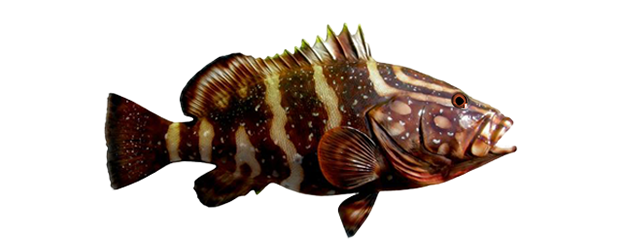Grouper, Nassau

View Regulations

Scientific Name
Epinephelus striatus


Common Names
White grouper, Bahamas grouper, Rockfish, Cherna criolla, Day grouper, Hamlet, Sweet Lip, Mero


Description
Nassau Grouper range in color depending on environment and age but generally appear between brown and reddish orange. It’s decorated with many darker or lighter bars, darker dots around the eye and a saddle shaped spot near the tail. The third dorsal spine is the largest and all other fins have rounded edges to them and may have splotches of color as well. The Nassau grouper can also change its color to darker shades if it feels threatened or is trying to blend in to its surroundings.


Habitat & Behaviour
Nassau Grouper can be found near the bottom around underwater structures such as reefs or rock ledges. A solitary fish, the Nassau Grouper has been known at times to be found in small groupings but for the most part they hunt alone in the daytime.


Natural Prey
Nassau Groupers have a diet consisting of smaller fish, crustaceans, invertebrates and cephalopods. However as it swallows its prey whole, the size of the mouth limits the size of the prey.


Handling Tips
Reef fish like the Grouper require anglers to use dehooking tools and venting tools to safely release the fish. When releasing keep in water, remove hook with pliers or dehooker and vent accordingly if you brought it up from a deep depth. Grouper all share a set of very sharp teeth and very sharp gill plates. Put fingers gently inside gill plate (just in corner , not too far inside), pinch outside of lip with thumb – easiest way to hang onto them. Spines not known to injure.

- Lucky Tackle Box
- Billfish Bounty in the Heart of the Mayan World – Guatemala
- The Best Species of Shark to Catch
- How to Catch a Shark: what equipment do you need?
- The Best Winter Fishing Spots in Texas






